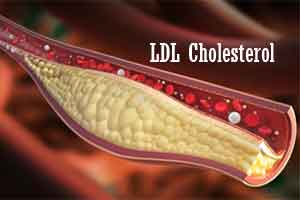- Home
- Editorial
- News
- Practice Guidelines
- Anesthesiology Guidelines
- Cancer Guidelines
- Cardiac Sciences Guidelines
- Critical Care Guidelines
- Dentistry Guidelines
- Dermatology Guidelines
- Diabetes and Endo Guidelines
- Diagnostics Guidelines
- ENT Guidelines
- Featured Practice Guidelines
- Gastroenterology Guidelines
- Geriatrics Guidelines
- Medicine Guidelines
- Nephrology Guidelines
- Neurosciences Guidelines
- Obs and Gynae Guidelines
- Ophthalmology Guidelines
- Orthopaedics Guidelines
- Paediatrics Guidelines
- Psychiatry Guidelines
- Pulmonology Guidelines
- Radiology Guidelines
- Surgery Guidelines
- Urology Guidelines
Only 40% of people with dangerously high cholesterol on appropriate drug treatment

National Cholesterol Education Program’s Adult Treatment Panel III (ATP-III guidelines) and the current American College of Cardiology and American Heart Association cholesterol guidelines recommend initiation of statin therapy in patients with LDL cholesterol at or above 190 mg/dL. In a nationally representative study Emily Bucholz, at Department of Medicine at Boston Children’s Hospital in Massachusetts and colleagues have found that less than 40 percent of people with severe elevations in cholesterol are being prescribed appropriate drug treatment.The study has been reported in the American Heart Association’s journal Circulation.
Data from the 1999-2014 National Health and Nutrition Examination Survey was used to estimate prevalence rates of self-reported screening, awareness and statin therapy among U.S. adults age 20 and older with severely elevated LDL or “bad cholesterol” levels of 190 mg/dL or higher. In addition, they considered a subgroup of patients with familial hypercholesterolemia, a genetic disorder that causes extreme elevations in cholesterol leading to an increased risk of early cardiovascular disease.
The frequency of cholesterol screening and awareness were high (at more than 80 percent) among adults with definite/probable familial hypercholesterolemia and severely elevated cholesterol; however, use of cholesterol-lowering statins was low (38 percent). Of those, only 30 percent of patients with severely elevated cholesterol had been prescribed a high-intensity statin.
The discrepancy between cholesterol screening and medical treatment was most pronounced in younger patients, uninsured patients, and patients without a regular source of healthcare – such as a doctor’s office or an outpatient clinic.
“Young adults may be less likely to think that they are at risk of cardiovascular disease, and clinicians may be less likely to initiate statin therapy in this population,” wrote lead author Emily Bucholz, M.D., Ph.D., MPH, Department of Medicine at Boston Children’s Hospital in Massachusetts. “It is possible that lifestyle modifications continue to be prescribed as an initial treatment prior to initiating statin therapy.”
“Markedly elevated levels of ‘bad’ cholesterol put you at increased risk of developing heart disease and developing it earlier in life,” said Circulation Editor-in-Chief, Joseph A. Hill. “If your ‘bad’ cholesterol is over 190 you should work with your physician regarding optimal drug treatment, in addition to lifestyle changes and management of other risk factors.”
Study authors said additional studies are needed to better understand how to close these gaps in screening and treatment.

Disclaimer: This site is primarily intended for healthcare professionals. Any content/information on this website does not replace the advice of medical and/or health professionals and should not be construed as medical/diagnostic advice/endorsement or prescription. Use of this site is subject to our terms of use, privacy policy, advertisement policy. © 2020 Minerva Medical Treatment Pvt Ltd